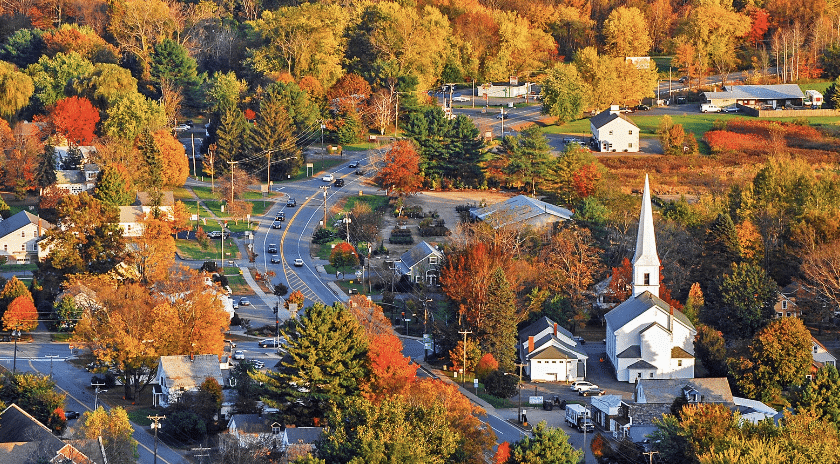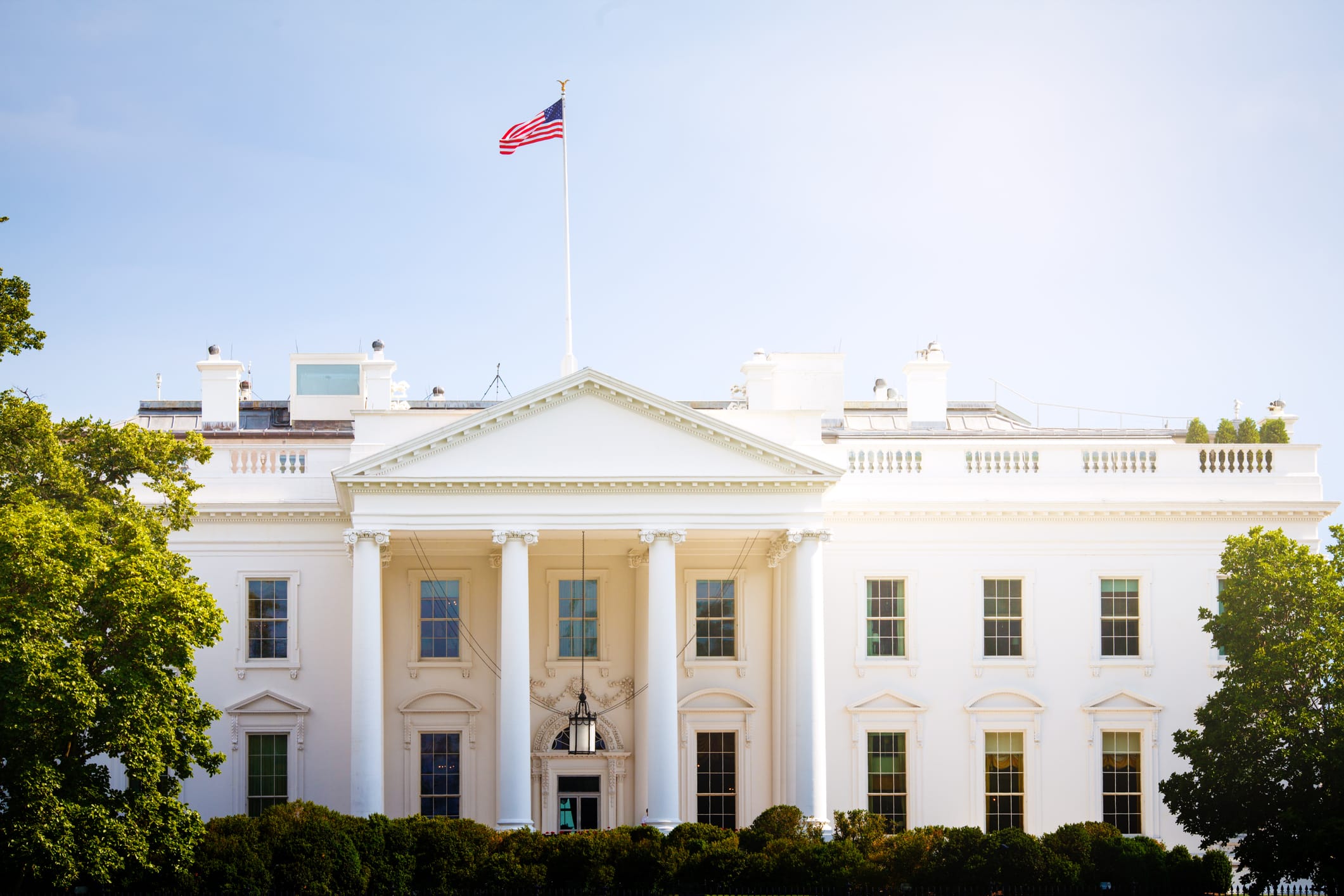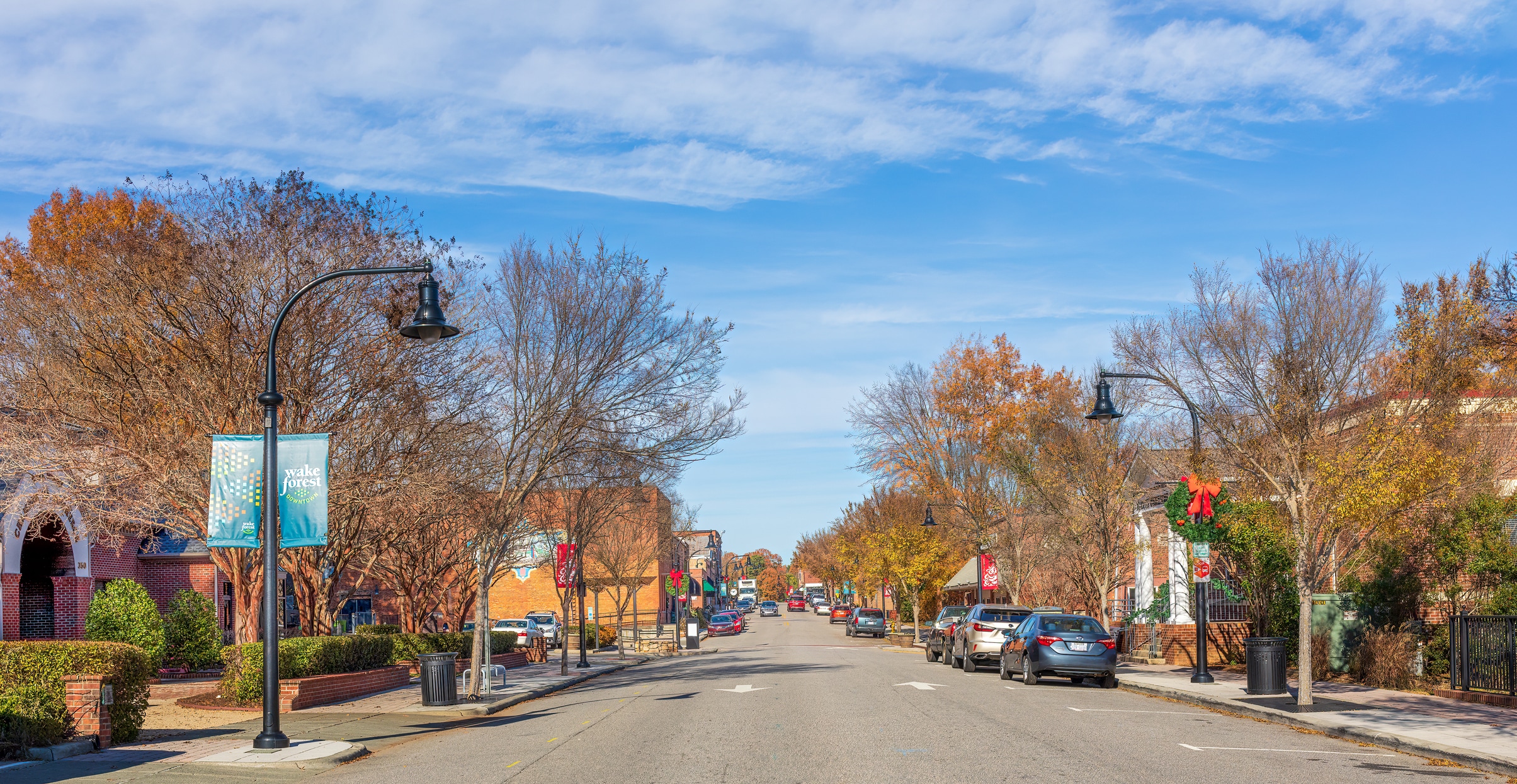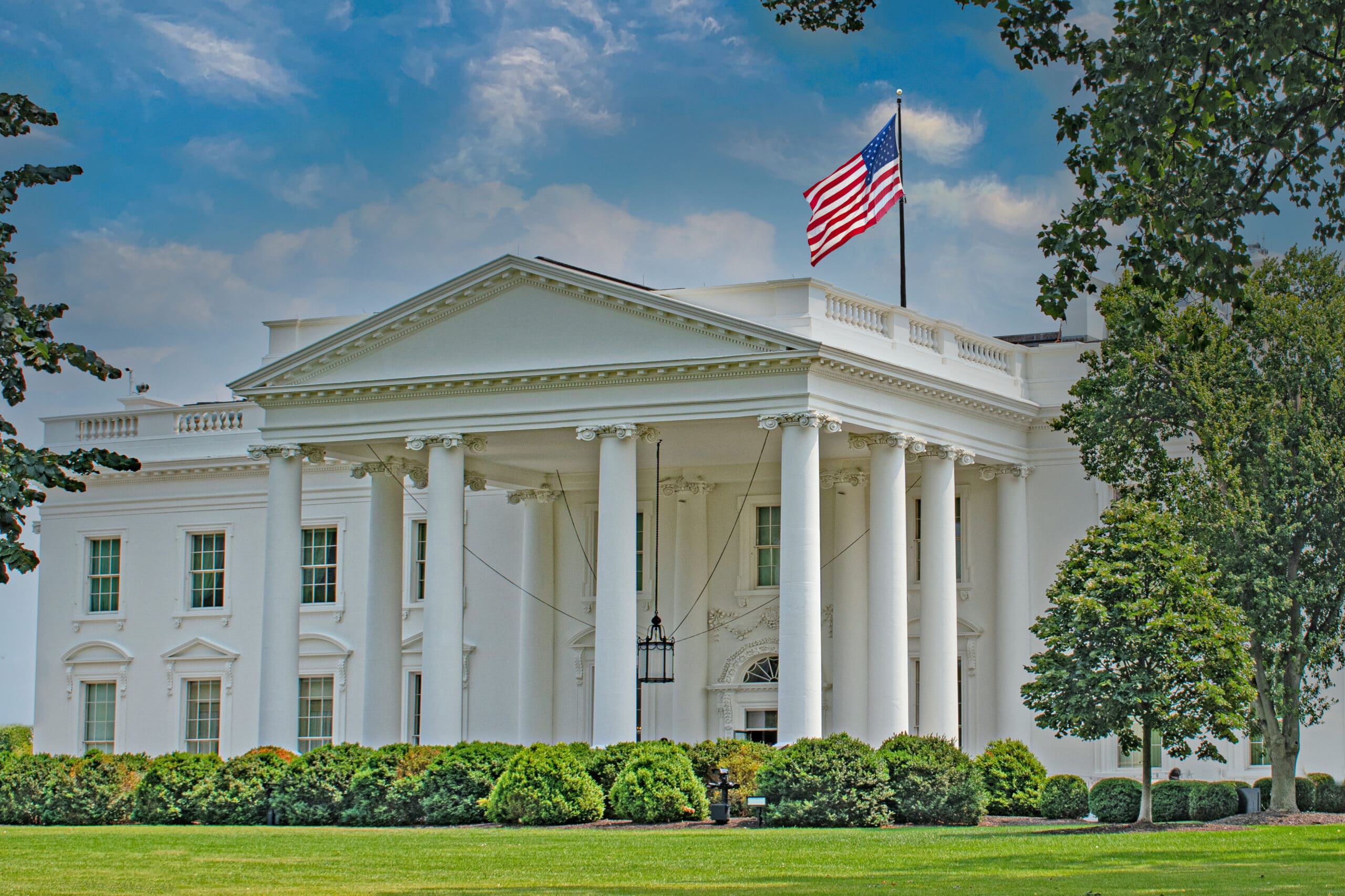Kelly Ayotte Leads Joyce Craig in Potential Granite State Gubernatorial Matchup
A new Emerson College Polling survey of New Hampshire voters finds President Joe Biden with a 43% job approval, a five-point increase from the March Emerson poll. Forty-six percent of voters disapprove of the job he is doing as president, a four-point decrease since the March survey. Half of voters (50%) approve of the job Governor Chris Sununu is doing in office, while 26% disapprove of Sununu’s performance. Sununu’s approval has increased by two percentage points since March, while his disapproval has lowered by four points.
“President Biden’s support has strengthened in New Hampshire since March,” Spencer Kimball, Executive Director of Emerson College Polling, said. “The President’s approval increase is fueled by a more unified approval among his party – 82% of Democrats approve of the job the President is doing, a 14-point increase from March.”
2024 PRESIDENTIAL PRIMARIES: DESANTIS FALLS TO SINGLE DIGITS, BIDEN STAYS STRONG
Forty-nine percent (49%) of Republican Primary voters in New Hampshire plan to support former President Donald Trump for the 2024 nomination, a 40-point advantage over all other candidates, similar to his 41-point lead in March. As the field of candidates has come more into focus since March, Florida Governor DeSantis no longer holds second place with double digits, instead has fallen to 8%.
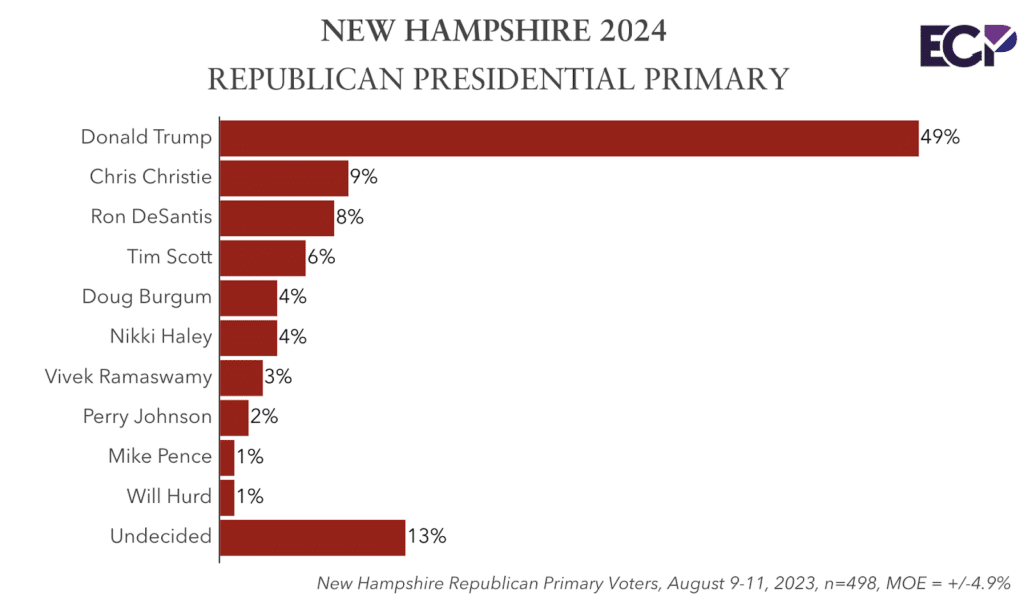
Former New Jersey Governor Chris Christie surpassed DeSantis for second-place in the Republican field: 9% of voters support his 2024 bid, while 8% support DeSantis.
“DeSantis has been the alternative to Trump in Emerson polling this presidential cycle. This is the first time we have seen DeSantis drop out of second place in our polling, and fall back into the pack of candidates,” Kimball said.
U.S. Senator Tim Scott (SC) follows with 6%, and North Dakota Governor Doug Burgum and Nikki Haley receive 4% respectively. Entrepreneur Vivek Ramaswamy trails at 3%, businessman Perry Johnson at 2%, former Vice President Mike Pence at 1%, and former Rep. Will Hurd at 1%. Thirteen percent (13%) of voters remain undecided.
- Middle-aged adults are less favorable of DeSantis – just 4% of voters ages 30 to 49 would support DeSantis, compared with 56% who support Donald Trump.
In the 2024 Democratic Primary, 65% plan to support President Biden, while 12% support Robert Kennedy Jr., and 4% support Marianne Williamson. Nineteen percent are undecided.
In a hypothetical 2024 Presidential matchup between Joe Biden and Donald Trump, Biden leads Trump 48% to 41%, while 7% would vote for someone else, and 4% are undecided. Biden’s seven-point lead in New Hampshire is an increase since March, when he held a four-point lead over Trump.
When Green Party candidate Cornel West is included on the ballot, support for Biden decreases to 44%, Trump to 39%, while West receives 5% of voters’ support. Six percent (6%) would vote for someone else, and 7% are undecided.
2024 GUBERNATORIAL ELECTION: AYOTTE & CRAIG HOLD EARLY LEADS
In a potential 2024 Democratic Gubernatorial Primary, a majority of voters (52%) are undecided. Thirty percent of Democratic state primary voters support Manchester Mayor Joyce Craig for Governor, while 15% support Executive Councilor Cinde Warmington. Two percent plan to support someone else.
In the 2024 Republican Gubernatorial Primary, 45% of voters support the former U.S. Senator Kelly Ayotte. Nine percent support former New Hampshire Senate President Chuck Morse, followed by New Hampshire Commissioner of Education Frank Edelblut at 4%, and former Hillsborough County Treasurer Robert Burns at 3%. Three percent (3%) of voters would support someone else, and 35% are undecided.
In a hypothetical 2024 matchup between Kelly Ayotte and Joyce Craig, 46% of voters support Ayotte, while 37% support Craig, and 17% are undecided. In a matchup between Ayotte and Cinde Warmington, support for Ayotte increases to 47%, while Warmington receives 34%, and 19% are undecided.
“With at least 17% of voters still undecided, there is plenty of room for the New Hampshire Governor’s race to change,” Kimball said. “The high approval rating of current Governor Chris Sununu could impact a potential race between Ayotte and Craig or Warmington, as voters generally approve of their Republican Governor.”
NEW HAMPSHIRE PRIDE: FIRST IN THE NATION STATUS OF IMPORTANT AMONG VOTERS
When asked if they support state legislation that requires New Hampshire’s presidential primary to be held seven days or more prior to any other state primary, a majority (65%) of voters support the law, while 10% of voters oppose the law and 26% are unsure.
- Republican voters are more likely to support legislation that maintains New Hampshire’s first-in-the-nation status: 73% of Republicans support the law, compared to 59% of Democrats.
Voters were also asked to rate New Hampshire as a place to live as compared to its neighboring state, Massachusetts. A majority of voters (61%) say New Hampshire is a much better place to live, while 30% say New Hampshire is a slightly better place to live. Eight percent of voters say New Hampshire is slightly worse, and 1% of voters say New Hampshire is a much worse place to live.
- Favorability toward New Hampshire in comparison to Massachusetts splits by party registration; 77% of Republican voters say New Hampshire was a much better place to live than Massachusetts, compared to 41% of Democrats who say the same.
NEW HAMPSHIRE ISSUES: ECONOMY, HOUSING AFFORDABILITY TOP OF MIND
The economy is the top issue for 32% of New Hampshire voters. Housing affordability is also a significant concern: 21% of voters cite it as the top issue facing New Hampshire. “Threats to democracy” is the top concern for 12% of voters, followed by healthcare (8%), abortion access (7%), education (7%), immigration (6%), and crime (3%).
- Younger voters are more concerned about housing affordability than other age demographics. Twenty-five percent of voters under the age of 50 picked housing affordability as their top issue, compared to 17% of voters over the age of 50.
Voter fraud was cited as the greatest threat to U.S. elections by 32% of voters, followed by voter suppression at 31%. Eleven percent (11%) of voters are most concerned with foreign interference in U.S. elections, and 9% are concerned about voting machines malfunctioning. Ten percent of voters believe there are no significant threats to elections in the U.S.
- What voters perceive as the greatest threat to U.S. elections varies by party; 60% of Republicans point to voter fraud as the greatest threat compared to just 11% of Democrats, while 55% of Democrats cite voter suppression as the greatest threat compared to just 5% of Republicans.
- Independents are more split, with 31% choosing voter suppression as the greatest threat, and 28% listing voter fraud as the greatest threat.
METHODOLOGY
The Emerson College Polling New Hampshire survey was conducted August 9-11, 2023. The sample of registered voters, n=837, has a credibility interval, similar to a poll’s margin of error (MOE), of +/- 3.4 percentage points. The data sets were weighted by gender, education, age, party registration, and region based on 2024 registration modeling. Modeling is based on U.S. Census parameters and New Hampshire voter registration and election data.
It is important to remember that subsets based on demographics, such as gender, age, education, and race/ethnicity, carry with them higher credibility intervals, as the sample size is reduced. Survey results should be understood within the poll’s range of scores, and understand with a confidence interval of 95% a poll will fall outside the range of scores 1 in 20 times.
Data was collected by contacting an Interactive Voice Response (IVR) system of landlines, an online panel of voters, and cellphones via SMS-to-web, and a consumer list of emails.
All questions asked in this survey with exact wording, along with full results and cross tabulations can be found here. This survey was funded by Emerson College.



